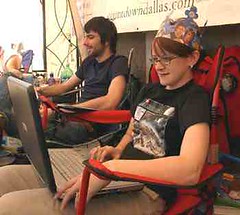Are we ready for the milk and meat of cloned animals to become a part of our food supply (FDA article)?
That was the topic of today's Diane Rehm show on NPR (listen to this episode here). And while there are a bunch of responses that I have to this topic, let's for the moment leave out any ethical concerns about cloning and simply talk about health concerns.
Claim 1: The two "pro-clone" guests agreed that cloned animals tend to have higher rates for still birth and miscarriages. However, they said there wasn't a reason for this, it was just a fact that it was a higher rate, and that therefore there is no health issue with these animals.
Rebuttal 1: I have a major issue with this. How can there be a higher rate, yet "no reason" for it? Of course there's a reason, otherwise this rate would not be significantly higher in cloned animals. I don't particularly want to consume these animals for the next twenty years it takes before the research provides the answer to "why," thanks anyway.
Claim 2: The FDA apparently sees no reason to label food as coming from cloned animals, because the FDA anticipates passing the animals as safe to consume. FDA claims that it only provide labels based on safety, not on other concerns.
Rebuttal 2: Maybe I misunderstand the relationship between the FDA and USDA, but the USDA provides a very clear labeling category for "organic," yet on the USDA official site, they continually, clearly state that "organic" does not necessarily mean healthier or safer food. It is an informational label only, albeit one granted after a strict battery of tests and approval process. If the FDA/USDA won't require a "cloned" label, which makes little sense to me, then what's the difference in providing a "Non-Cloned Animal Product" label with a similar approval process?
In addition, the guests said that if the FDA approves cloned foodstuffs, they would be eligible for the "organic" label if they met all other requirements. Um... organically produced by man in a lab? I don't know about you, but to me the point of the "organic" label was to get back to the natural way of harvesting food.
Near the end, one of the guests stated that although his own surveys revealed that 2/3 of Americans would not buy cloned animal foodstuffs if given a choice, he believes that this attitude would quickly change with education about the cloning process. He cites as his example that most Americans are under the impression that larger chicken breasts are due to genetic engineering, and that Americans buy these products. He then states that in fact, the larger breasts are due to selective breeding.
First, "selective breeding:" is this a code word for "heavily injected with hormones?" Secondly, I have no idea why he made the point based on supposed American assumptions--I certainly haven't been assuming that larger chicken breasts were due to genetic manipulation. Thirdly, why the heck does he think that "education" about a process with which many Americans have deep ethical reservations will suddenly change their minds? It's a ridiculous assumption that revealing a detailed scientific process will suddenly relieve those who are afraid that cloned foodstuffs is a baby step toward human cloning.
The ironic thing is, I'm not fully convinced that this is a step in that direction. When in-vitro fertilization first came around, there was a lot of controversy for similar reasons, and now it's widely accepted for both animal and human reproduction. I just don't want to get into my own ethical concerns about human cloning here. My concerns are that it has only been eight years since Dolly the sheep was cloned. I don't feel that is nearly a long enough time to determine long-term health effects on the animals themselves, their nutritional effect on humans, or unforseen long-term effects on the environment as a whole.
Note: The information I am citing comes from the three guests on Diane Rehm's show (their names are presented on the website). If you have issues with the information presented here, please take it up with them, not me.
Subscribe to:
Post Comments (Atom)


No comments:
Post a Comment